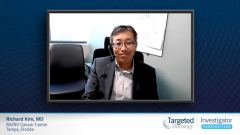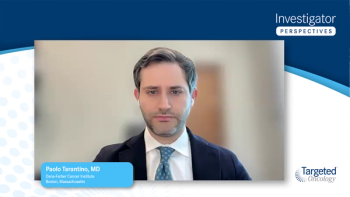
IMbrave150: Frontline Atezolizumab + Bevacizumab in Unresectable HCC
Richard Kim, MD, shares insight on positive results from IMbrave150, which tested the frontline combination of atezolizumab and bevacizumab in patients with unresectable HCC.
Episodes in this series
Richard Kim, MD: The pivotal study that got atezolizumab and bevacizumab approved is IMbrave150. This was a randomized phase 3 study comparing the control arm, which is sorafenib, to atezolizumab plus bevacizumab, based on the phase 1 trial that had very promising results. This trial had a dual primary end point of PFS [progression-free survival] and overall survival [OS]. The PFS data were presented last year; and this year at ASCO GI [American Society of Clinical Oncology Gastrointestinal Cancers Symposium], the follow-up on overall survival was presented. Basically what the trial showed was that the combination of atezolizumab and bevacizumab was superior to sorafenib in terms of the response rate, which was hovering around 30%. There was improvement in PFS, which was first reported last year, by a little over 2 months. This year at ASCO GI, there were overall survival data presented showing 19 months with atezolizumab plus bevacizumab compared to about 13 to 14 months of OS with sorafenib.
Nineteen months in advanced hepatocellular carcinoma is the longest overall survival we’ve seen in any of the studies. Clearly, these data show that the combination of atezolizumab plus bevacizumab is superior to sorafenib, and not only in terms of response rate and PFS. There was definitely a trend toward overall survival even though the P value was not significant. In terms of adverse events in the study, there was not much difference between the 2 arms. We saw a little more hypertension in the bevacizumab arm because it is a more potent VEGF inhibitor, and we saw more hand-foot skin reactions with sorafenib, which is expected. But the arm of atezolizumab and bevacizumab was very well tolerated. There were few grade 3 or 4 events. Most of the adverse events we saw were grade 1 and 2, and the highest grade 3 and 4 adverse event seen in the trial was hypertension, which we know how to manage. Overall, the trial concluded that atezolizumab and bevacizumab were very well tolerated. It showed superior efficacy, response rate, PFS, and a trend toward overall survival.
Based on that pivotal study, the combination was approved by the FDA and is in the NCCN [National Comprehensive Cancer Network] guidelines as well. In our practice, that was a practice-changing trial. A lot of patients with advanced hepatocellular carcinoma with a Child-Pugh A score, as that study was done in the Child-Pugh A setting, will get this combination. One of the caveats to this is that in my practice, I use endoscopy just like in the trial to avoid any unwanted bleeding. We perform an endoscopy to make sure there’s no variceal bleeding. In the era of COVID-19, if you’re having a tough time performing endoscopy, what happens in my practice is that I will start with atezolizumab first. If the endoscopy’s done later, and if there’s no evidence of variceal bleeding, then I add Avastin [bevacizumab]. That’s how I do it in the era of COVID-19.
Transcript edited for clarity.






































